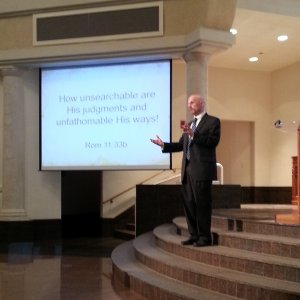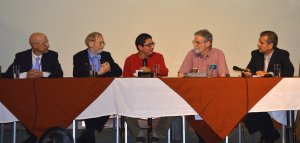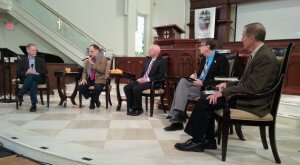You go into Christian spaces to talk about the nexus of science and religion. Who’s involved and what is the goal?
We are a small team of Christian scientists, including geologist Ken Wolgemuth, biologist Joel Duff, and myself, committed to removing stumbling blocks to faith in Christ through education on the scientific and biblical evidence for an ancient creation. You can find that mission statement on the masthead of the Solid Rock Lectures website, and it reflects the desire of other organizations we partner with such as BioLogos. Everything we do has this theme, where we are trying to remove misunderstandings of science that are presenting obstacles to faith, and removing misunderstandings of the Bible that pose obstacles to appreciating science.
Originally, we thought we would develop a single workshop that we could take on the road, but as we have traveled to seminaries, colleges, churches, and Christian organization meetings, we found that varying needs, interests, and institutional constraints necessitated considerable customization in the name, specific objectives, and material covered. After presenting in more than twenty states, six countries, and four continents, I am pretty sure we have never repeated the same workshop or seminar twice.
This project has personal resonance for you. How did the idea take shape?
I had the benefit of growing up in an extended Christian family that included science teachers and preachers. I was encouraged to ask questions, explore, and dig deeper from a young age, and never encountered a sense that the Bible and science were at odds. But I later saw the turmoil in other people’s lives over perceived conflicts. A warfare mentality between science and Christian faith has left a great deal of damage in its wake. We’re seeing the scientific enterprise suffer for it, and we’re seeing the witness of the church eroded. In the church, people are drawing lines in the sand and saying, “We’re real believers and you’re not,” over disagreements that should be peripheral to the faith.

Gregg Davidson speaking at the Palm Beach Atlantic University Chapel Series.
As a Christian with a Ph.D. in the earth sciences, I recognized the unique voice that scientists of faith have. If an atheist wants to go in and speak to faith groups about the merits of science, they may gain an audience with more liberal churches, but the message often falls on deaf ears when trying to reach more Bible-centered churches. The reason is not just recalcitrance; people have a limited capacity to absorb and process all the relevant information, so they look for experts or specialists that they trust to distill that information for them.
That’s where scientists of faith have a unique voice. When one of us enters a church and starts off with an affirmation of the core Christian doctrines, we earn a measure of trust, gaining at least the opportunity to be heard. Once we get past concerns that science is going to be used to supersede the Bible, doors open to be able to share really cool stuff that we find in nature and in scripture.
Scientists of faith have a unique voice. When one of us enters a church and starts off with an affirmation of the core Christian doctrines, we earn a measure of trust, gaining at least the opportunity to be heard.
How do you approach people who may feel that their faith is being attacked by science?
The idea of removing misunderstandings about the Bible that seem to conflict with science is really key. Just explaining why the science is compelling for subjects like the age of the Earth is not enough. What may be considered a slam-dunk scientific argument falls short if people perceive it to be at odds with their core religious beliefs. So, our approach always starts with the Bible, where we can ask questions like, “Should science have any role in understanding the Bible?” Or noting that Christians once thought the Bible taught the Earth is the center of the universe, but now don’t, and asking “How did we do that while still believing the Bible to be true?” Note that question isn’t worded as, “How did you do that,” but as, “How did we do that?
We can then bring our own church history to bear, showing how science has informed our biblical understanding without ever elevating science above scripture. The science of Galileo raised questions that drove thoughtful Christians back to the Bible with new eyes to see new things, recognizing that there were assumptions that had been made about the meaning of particular passages that turned out to be unjustified, and appreciation of the Bible actually grew.
From that point, we can start talking about the scientific evidence. We’ve been amazed at the receptivity to scientific evidence once people realize their faith is not under direct assault. It is as if a filter is removed from eyes and ears that allows people to see and hear things that were always out there, but never engaged.
What may be considered a slam-dunk scientific argument falls short if people perceive it to be at odds with their core religious beliefs.
How do you tailor each event to the community and participants?
One consideration is the time that we have allotted. Sometimes it’s a little as an hour, sometimes it has been up to an entire week with 35 contact hours for university credit. Another consideration is what the host institution thinks their people would benefit most from hearing. And we need to be sensitive to constraints they may face with important donors, administrators, or constituents. As an example, a group might not be ready to hear about evolution, but okay with wrestling with the age of the Earth. So we meet them where they are at.
Often we’ll go to the institution’s website and look up their official statement of biblical interpretation. Sometimes we’ll take an excerpt from that and put it up on the screen and ask people, “Where does this come from?” It’s a fun exercise, because most of the time, people don’t know. And we say, “This is your own institution’s statement, and I want you to know we’re going to be entirely consistent with it today.” The reaction often is like, “Really? Wait, you’re going to talk about something that I was prepared to disagree with, but you’re telling me it’s in complete concordance with my institution’s statement of biblical interpretation?” Yes, indeed.
Have there been times when you felt you’d helped someone reconcile evolution with a Christian perspective?
Often, actually. One I recall in particular was a program for Christian high school science teachers. It was a multiple-day event sponsored by BioLogos. A biology teacher wrote us afterward to share that after hearing first how we had worked through biblical questions as Christian scientists, and then hearing the evidence for evolution, she had left the event horrified that she had been dismissive for years—not just of the evidence of evolution, but realizing she’d been unintentionally dismissive of God’s amazing creativity of life through time. But then she told us how excited she was to change that message moving forward. Such transformations have wonderful ripple effects, for she is now communicating that same excitement to each new class of students at her school.
A biology teacher wrote us [after an event] to share that…she had left the event horrified that she had been dismissive for years—not just of the evidence of evolution, but realizing she’d been unintentionally dismissive of God’s amazing creativity of life through time. But then she told us how excited she was to change that message moving forward.
What challenges have you encountered? Have there been people resistant to your message?
One challenge has been institutional financial limitations. Few seminaries, for example, have a budget for bringing in scientists to teach even on a short-term basis. Sometimes we have grants to cover expenses and sometimes not, so that’s always a challenge. But the answer that was probably expected was pushback from opposing views. Pushback comes from two extremes. You have the biblical literalists at one end who publicly proclaim that you are undermining faith or belief in the Bible, and criticism from materialists, at the other extreme, who think all efforts to reconcile science and religious faith are undermining science. You get it from both sides, and you have to learn to grow a thick skin.

An event at the Theological Seminary of Central America, Guatemala City, Guatemala.
But there has also been a lot of support. I’m at a secular university—24 years at the University of Mississippi; the last seven years as chair of my department. Before I started doing this project, I approached my chair at the time, my dean, the provost, the university attorney, and eventually the chancellor, telling each of them what I was planning to do. I didn’t want them to be surprised by it, and wanted to give them the opportunity to tell me any concerns they had. Amazingly, they all thought it was a great idea. They saw the value of the scientific outreach and the potential to increase scientific appreciation, whether they agreed with my religious beliefs or not. That has been such a blessing.
What advice would you give to someone interested in doing something similar?
I have two categories of advice. The first is for scientists in general. Recognize the importance and value of community in getting a message out, and recognize the value of scientists of faith reaching their own faith communities. Be supportive of such targeted efforts. Even though my home institution is pretty supportive, I can give you plenty of discouraging examples of institutions or websites where there’s just mockery and ridicule for bothering with religious believers, with no recognition that they are undermining their own mission.
For Christian scientists, I will make three quick points: One is to avoid getting overly fixated on results. Be a voice of change, walk the path you feel led to walk, and let God worry about changing hearts. There’s a tremendous burden released when you stop worrying about convincing people and just walk the path set before you. A second point is to focus less on convincing Christians or religious people that science is right, and more on giving people an appreciation that their brothers and sisters in the pew ahead of them who do accept science actually have a biblical argument for doing so. That increases unity and opens doors to at least consider the science further. And the last point is to listen to respectful criticism and learn to shrug off the rest, because it definitely will come.
Here’s a little anecdote about the last point. One day, one of the leaders in my church asked me if I had seen a particular book called Theistic Evolution: A Sinful Compromise. When I said I had not, he replied, “You might want to.” I asked if I was mentioned in it. He answered with, “You kind of have a whole chapter.” Intrigued, I picked up a copy. I later came back to my friend quite pleased. And he looked at me like, “Did you actually read it? You saw the awful things he said about you?” “Yeah,” I said, “but there were four chapters that were devoted to individual people, and the other three were C. John Collins, Tim Keller, and Ron Choong.” These were people that I have tremendous respect for, each a leader in his field. “The author puts me on the same billing with those three. This is awesome!” That’s the kind of the attitude that you have to develop to be able to enter this fray and not just be continuously irritated or offended.
How do you work with your collaborators on these events?

Debate at the Southeastern Southern Baptist Theological Seminary.
This project is a team effort as much as possible. Essays and books have often been a team effort, and where resources allow, we try to have two or three of us at speaking venues, especially if they are extended workshops. It helps those listening to see that our message isn’t just one person’s viewpoint, it provides us with a greater sense of team support, and it increases our ability to self-assess how things are working. I can’t advocate for the value of this strongly enough.
Do you think your approach would be fruitful in non-Christian spaces, like synagogues, mosques, or Buddhist temples?
Yes, in different ways—one as an “insider” and one as an “outsider.” The first goes back to the importance of community, that people are much more willing to listen if they identify the messenger as being inside their own group. A Muslim or Buddhist scientist is more likely to have a voice among their own faith tradition than someone who does not share the same faith. The second recognizes potential value when speaking to a group outside your own faith-tradition, with adjusted expectations. For those speaking to a group where they’re not considered a full-fledged community member, they can still make a relational connection by verbalizing the importance of the group’s beliefs, acknowledging the reality of things that are not necessarily testable by science, or simply expressing the desire to be part of a conversation rather than coming to dictate belief.
I was recently at a meeting that was mostly evangelical Christians, but it included one atheist geneticist and one Jewish scientist. Though these two were outside “the community,” they were successful in expressing their interest in having respectful dialogue, their desire to find common ground, and their willingness to listen. They were surprised at the subsequent openness of the group to their input.
There’s value in speaking to anyone willing to listen, but if we ignore the value of those that are actually inside the faith community reaching out to their own faith groups, then we’re really missing out on an opportunity.





